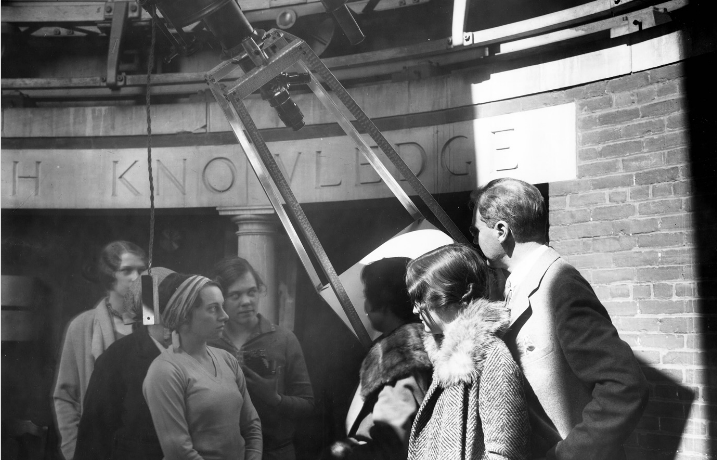On April 8 at 3:29 p.m., Wellesley College community experienced a 93% solar eclipse. Between 2:00 to 4:30 p.m. student faculty and staff joined together at the Observatory to view this event which over 1,000 people attended. Although the eclipse lasted just a couple hours, the planning for this event started months in advance. With the help of staff, the A.S.T.R.O Club and their volunteers, thousands of people were able to safely view the eclipse.
One person who was central to planning this event was Jonathan Kemp, the observatory manager and instruments technician for many of the sciences at Wellesley.
“I see the observatory as a fundamentally interdisciplinary facility … and I think there is a place here at the observatory for everyone,” he said. Prior to the eclipse he thought the “upcoming eclipse event [would] be an excellent opportunity for making … connections and allowing people to be curious about our sky, our solar system, and our universe.”
Amie Lopez ’26 is a general member of the A.S.T.R.O club who spent April 8 volunteering at the on-campus event.
“[Planning started] weeks prior to the eclipse event,” he said. “The going-to-be Co-President [of the A.S.T.R.O Club] Treya Pember and Jonathan Kemp were the people trying to ensure that everyone was trained on how to use the telescope, since a majority of those who were trained were going on the trip to Vermont.”
On the day of the event Lopez spent hours making sure that everything ran according-to-plan, and that Wellesley students, faculty and staff were able to safely view the eclipse.
“The volunteers were set up to execute the event, set everything up an hour or two before the event, make sure that everything ran smoothly, that people were having fun, and that we cleaned up afterwards,” he said.
Treya Pember ’25, an astrophysics major, is the current Co-Events chair for the A.S.T.R.O Club and was active in helping plan the on-campus event.
“I started recruiting volunteers in February and trained them on safety guidelines for students to observe the eclipse safely, both with glasses and the telescopes we have at the observatory,” she said.
In addition to planning the on-campus viewing event, Pember also viewed the eclipse in Vermont as part of a trip along with several Astrophysics and Physics majors and faculty members. About 20 students and faculty viewed the eclipse from Derby Line, VT where full totality occurred. Pember spoke about the impact the moment had on her and others.
“So many things changed so quickly, the air got colder and the light got flat and orange,” she said. “When totality started, we all cheered, and I was frozen in place for the whole three minutes … a lot of my physics major friends told me they understood why I study astrophysics. ”
Many of the people involved in astronomy and the eclipse planning focused on the community within the department, the A.S.T.R.O club, and the Observatory, and their want for all of the Wellesley community to join in these spaces.
Jonathan Kemp emphasized that every Wellesley student, no matter their major, has a place at the Observatory.
“Part of our fabric at the Observatory is to share our experience of the universe and to reach out across disciplines … Physics and astronomy students may look through a telescope and see a star and think about the nuclear processes at the center of the star, but then we might have a humanist, a non-science major who does not think about the sky that often,” he said. “But there is absolutely a place for them to look through the telescope and experience the universe, to think about their place in the universe, to understand the universe better, and the only common thread that’s required is intellectual curiosity.”
Lopez expressed their amazement at the amount of students that attended the on-campus event on April 8.
“More than 1,000 students showed up to the event, and that was an insane number because normally the Observatory only hosts a few classes inside and seems to only have astrophysics majors walking in and out of it. I would say that it’s a very isolating place,” they said. ”So for people, in those droves of numbers, to come to the observatory all together, we were like ‘Wow, this is the Wellesley community showing up.’”
Pember hopes that people continue to show their interest in the Observatory even after the eclipse.
“I wish more people knew how rare an observatory like Wellesley’s is, and how easy it is to use the telescopes here, take advantage of it!”




